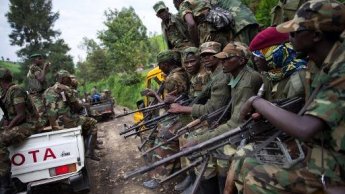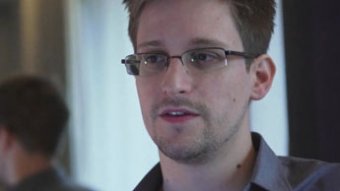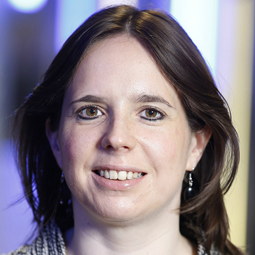Mon, 12/30/2013 - 21:28
6 newish journalistic keywords of 2013
Writing headlines all day long at FRANCE 24 makes one sometimes feel like a walking encyclopaedia. But it does offer a good vantage point to notice “new” words. As the year draws to a close, here is a look back, in no particular order, at some new(-ish) journalistic terms that often cropped up in headlines in 2013.
1. The OPCW. Most people were no doubt unaware of the existence of the Organisation for the Prohibition of Chemical Weapons before this September, when it was called upon to help dismantle the Syrian regime’s chemical arms stockpile. (That, of course, followed an eleventh-hour Russian-brokered deal which averted Western military intervention). Set up in 1997, the OPCW has already helped (or is still helping) seven countries, including the US, Russia and Libya, dispose safely of their chemical arsenals. The fact that it was awarded the Nobel Peace Prize in October "for its extensive efforts to eliminate chemical weapons" was both unexpected and controversial. It was the second time in a row the award has gone to an institution, rather than an individual, after the European Union last year.
2. The M23. No, not the latest rap group, but rather the main rebel movement in the mineral-rich east of the Democratic Republic of Congo. The M23 rebels, mostly Tutsis, were said to be backed by Rwanda and Uganda, which both countries denied. 2013 saw the Congolese army eventually rout them after a 20-month insurgency, leading to a peace deal being signed earlier this month in Nairobi. One of the M23’s former leaders, Bosco Ntaganda, is now awaiting trial at the ICC in The Hague (he had surrendered to the US embassy in Rwanda after losing an internal power struggle). Their last leader, Sultani Makenga, surrendered to Uganda in November. It is unclear whether he will be extradited to the DRC (so far, there is no ICC arrest warrant out for him).

M23 rebels. Photo © AFP.
3. Shutdown. 2013 saw parts of the US federal government literally shut down for the first time in 17 years. Over 800,000 “non-essential” employees were forced to stay at home on unpaid leave for 16 days. The embodiment of partisan politics at its worst, the shutdown was a result of Congress failing to agree on a budget, as Republicans kicked up a fuss over funding Obamacare and Democrats refused to compromise. In the end, a deal was reached to raise the debt ceiling - and a further deal reached earlier this month to avoid another shutdown in January 2014 - but the episode was a new low for the image of US elected representatives.
4. Couac. The French word for “false note”, the delightfully onomatopoeic “couac” became a staple of French newspaper headlines in 2013, generally preceded by the word “nouveau”. These couacs generally involved one cabinet minister openly disagreeing with another (for example, the tough-talking Interior Minister Manuel Valls clashing with the more liberal Housing Minister Cécile Duflot over the integration of the Roma people), or contradicting the Prime Minister, Jean-Marc Ayrault (Ecology Minister Delphine Batho implicitly criticised the whole government by saying the budget was “bad” for her ministry - she was promptly sacked by President François Hollande). Hollande was even contradicted himself, by none other than… his own prime minister (on the subject of when there would be a “pause” in new taxes). A general impression of amateurism and poor communication emerged that will be hard for the government to shake off.
6. Royal baby. The latest addition to the British monarchy, who basically showed up late, eventually graced us with his presence on July 22nd. “I'll remind him of his tardiness when he's a bit older”, his dad Prince William joked as he and the Duchess of Cambridge presented little Prince George to the entire world’s media. The law had even been - unnecessarily, as it turned out - changed to enable the royal baby to become third in line to the British throne regardless of its sex. Amid the media frenzy, partly caused by the baby’s tardiness, one publication managed to remain factual. “Woman Has Baby”, headlined the satirical fortnightly Private Eye, poking fun at the media circus.
Thumbnail photo © FRANCE 24.
1. The OPCW. Most people were no doubt unaware of the existence of the Organisation for the Prohibition of Chemical Weapons before this September, when it was called upon to help dismantle the Syrian regime’s chemical arms stockpile. (That, of course, followed an eleventh-hour Russian-brokered deal which averted Western military intervention). Set up in 1997, the OPCW has already helped (or is still helping) seven countries, including the US, Russia and Libya, dispose safely of their chemical arsenals. The fact that it was awarded the Nobel Peace Prize in October "for its extensive efforts to eliminate chemical weapons" was both unexpected and controversial. It was the second time in a row the award has gone to an institution, rather than an individual, after the European Union last year.
2. The M23. No, not the latest rap group, but rather the main rebel movement in the mineral-rich east of the Democratic Republic of Congo. The M23 rebels, mostly Tutsis, were said to be backed by Rwanda and Uganda, which both countries denied. 2013 saw the Congolese army eventually rout them after a 20-month insurgency, leading to a peace deal being signed earlier this month in Nairobi. One of the M23’s former leaders, Bosco Ntaganda, is now awaiting trial at the ICC in The Hague (he had surrendered to the US embassy in Rwanda after losing an internal power struggle). Their last leader, Sultani Makenga, surrendered to Uganda in November. It is unclear whether he will be extradited to the DRC (so far, there is no ICC arrest warrant out for him).

M23 rebels. Photo © AFP.
3. Shutdown. 2013 saw parts of the US federal government literally shut down for the first time in 17 years. Over 800,000 “non-essential” employees were forced to stay at home on unpaid leave for 16 days. The embodiment of partisan politics at its worst, the shutdown was a result of Congress failing to agree on a budget, as Republicans kicked up a fuss over funding Obamacare and Democrats refused to compromise. In the end, a deal was reached to raise the debt ceiling - and a further deal reached earlier this month to avoid another shutdown in January 2014 - but the episode was a new low for the image of US elected representatives.
4. Couac. The French word for “false note”, the delightfully onomatopoeic “couac” became a staple of French newspaper headlines in 2013, generally preceded by the word “nouveau”. These couacs generally involved one cabinet minister openly disagreeing with another (for example, the tough-talking Interior Minister Manuel Valls clashing with the more liberal Housing Minister Cécile Duflot over the integration of the Roma people), or contradicting the Prime Minister, Jean-Marc Ayrault (Ecology Minister Delphine Batho implicitly criticised the whole government by saying the budget was “bad” for her ministry - she was promptly sacked by President François Hollande). Hollande was even contradicted himself, by none other than… his own prime minister (on the subject of when there would be a “pause” in new taxes). A general impression of amateurism and poor communication emerged that will be hard for the government to shake off.
5. Whistleblower. OK, whistleblowers are nothing new, but the actions of one Edward Snowden had an enormous impact on world affairs in 2013. Be it the revelations concerning the NSA’s spying on you and me, or on world leaders (nothing new, but certainly awkward to explain over dinner), the genie is most definitely out of the bottle. Snowden’s actions prompted comparisons with that other whistleblower, Daniel Ellsberg, who leaked the Pentagon Papers - secret documents on the Vietnam War - in 1971. Ellsberg himself praised Snowden, saying the younger man’s NSA revelations were more important than his own. "Snowden's whistleblowing gives us the possibility to roll back a key part of what has amounted to an 'executive coup' against the U.S. constitution”, he told The Guardian. Interestingly, the French press initially struggled to describe Snowden, some media outlets incorrectly calling him a “taupe” (mole) before almost everyone settled for the somewhat clunky “lanceur d’alerte”.

Edward Snowden. Photo © The Guardian.

Edward Snowden. Photo © The Guardian.
6. Royal baby. The latest addition to the British monarchy, who basically showed up late, eventually graced us with his presence on July 22nd. “I'll remind him of his tardiness when he's a bit older”, his dad Prince William joked as he and the Duchess of Cambridge presented little Prince George to the entire world’s media. The law had even been - unnecessarily, as it turned out - changed to enable the royal baby to become third in line to the British throne regardless of its sex. Amid the media frenzy, partly caused by the baby’s tardiness, one publication managed to remain factual. “Woman Has Baby”, headlined the satirical fortnightly Private Eye, poking fun at the media circus.
Thumbnail photo © FRANCE 24.
Tags for all blogs :
Comments or opinions expressed on this blog are those of the individual contributors only, and do not necessarily represent the views of FRANCE 24. The content on this blog is provided on an "as-is" basis. FRANCE 24 is not liable for any damages whatsoever arising out of the content or use of this blog.




1 Comments
Post new comment